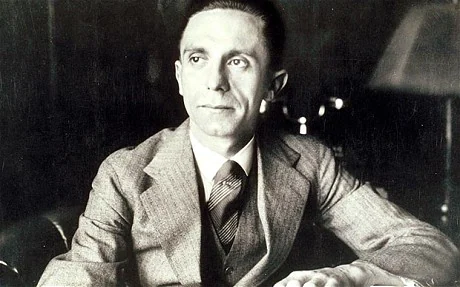Een tijdje terug heb ik hier de "Code voor de journalistiek" gepubliceerd.
Recente ontwikkelingen, oa bij Zembla hebben me doen besluiten om ook hier de Goebbels principes te publiceren.
Waarom? Vergelijk beide een smet elkaar, en bepaal voor je zelf waar het fout gaat in de journalistiek door een fout dwaling of incident, en waar er structureel aan de jouranlistiek, de rechtstaat en de democratie wordt gezaagd.
https://www.physics.smu.edu/pseudo/Propaganda/goebbels.html
Propaganda - Goebbels' Principles
Joseph Goebbels
Dr. Joseph Goebbels, beside being an intriguing character, was the Propaganda Minister for Hitler's Third Reich. He was recognized as a master of propaganda as his work was studied after WWII. Goebbels did not survive to enjoy the recognition; he and his wife committed suicide on 1 May 1945, a week before the final collapse of the Third Reich.
After the war, US personnel discovered a very large diary dictated by Goebbels. In it are his principles of propaganda. Leonard Doob's 1950 article details them from a translation of the diary by Louis Lochner (1948).
Hitler's Basic Principles
These principles are abstracted from Jowett & O'Donnell.
Avoid abstract ideas - appeal to the emotions.
Constantly repeat just a few ideas. Use stereotyped phrases.
Give only one side of the argument.
Continuously criticize your opponents.
Pick out one special "enemy" for special vilification.
Goebbels' Principles of Propaganda
When reading these propaganda principles, keep in mind that they were applied in wartime (WWII) and involve issues that don't arise otherwise. It's a long list, but Goebbels was dealing with the complexity of an all-out war. While reading them you may realize that some of the principles are generally applicable and not limited to wartime. Some might be quite familiar today. It is interesting to note that Goebbels' principles derive from Hitler's own ideas of propaganda.
Propagandists must have access to intelligence concerning events and public opinion.
Propaganda must be planned and executed by only one authority.
It must issue all the propaganda directives.
It must explain propaganda directives to important officials and maintain their morale.
It must oversee other agencies' activities which have propaganda consequences.
The Propaganda consequences of an action must be considered in planning that action.
Propaganda must affect the enemy's policy and actions.
By suppressing propagandistically desirable material which can provide the enemy with useful intelligence.
By openly disseminating propaganda whose contents or tone causes the enemy to draw the desired conclusions.
By goading the enemy into revealing vital information about himself.
By making no reference to a desired enemy activity when any reference would discredit that activity.
Declassified, operational information must be available to implement a propaganda campaign.
To be perceived, propaganda must evoke the interest of an audience and must be transmitted through an attention-getting medium.
Credibility alone must determine whether propaganda output should be true or false.
The purpose, content, and effectiveness of enemy propaganda; the strength and effects of an expose'; and the nature of current propaganda campaigns determine whether enemy propaganda should be ignored or refuted.
Credibility, intelligence, and the possible effects of communicating determine whether propaganda materials should be censored.
Material from enemy propaganda may be utilized in operations when it helps diminish that enemy's prestige or lends support to the propagandist's own objective.
Black rather than white propaganda must be employed when the latter is less credible or produces undesirable effects.
Propaganda may be facilitated by leaders with prestige.
Propaganda must be carefully timed.
The communication must reach the audience ahead of competing propaganda.
A propaganda campaign must begin at the optimum moment.
A propaganda theme must be repeated, but not beyond some point of diminishing effectiveness.
Propaganda must label events and people with distinctive phrases or slogans.
They must evoke responses which the audience previously possesses.
They must be capable of being easily learned.
They must be utilized again and again, but only in appropriate situations.
They must be boomerang-proof.
Propaganda to the home front must prevent the raising of false hopes which can be blasted by future events.
Propaganda to the home front must create an optimum anxiety level.
Propaganda must reinforce anxiety concerning the consequences of defeat.
Propaganda must diminish anxiety (other than that concerning the consequences of defeat) which is too high and cannot be reduced by people themselves.
Propaganda to the home front must diminish the impact of frustration.
Inevitable frustrations must be anticipated.
Inevitable frustrations must be placed in perspective.
Propaganda must facilitate the displacement of aggression by specifying the targets for hatred.
Propaganda cannot immediately affect strong counter-tendencies; instead it must offer some form of action or diversion, or both.
These would be principles guiding the conduct of propaganda operations.
References
Goebbels' Principles of Propaganda, Leonard W. Doob, Public Opinion Quarterly, Fall 1950 pp. 419-442
Propagation and Persuasion; Jowett & O'Donnell




















0 Comments